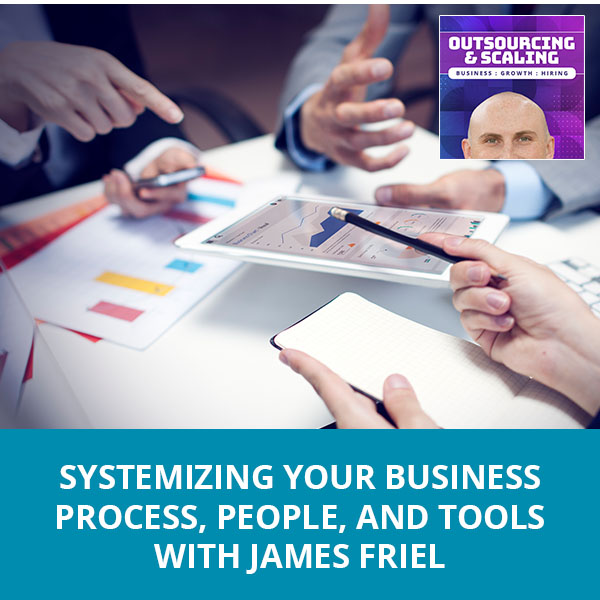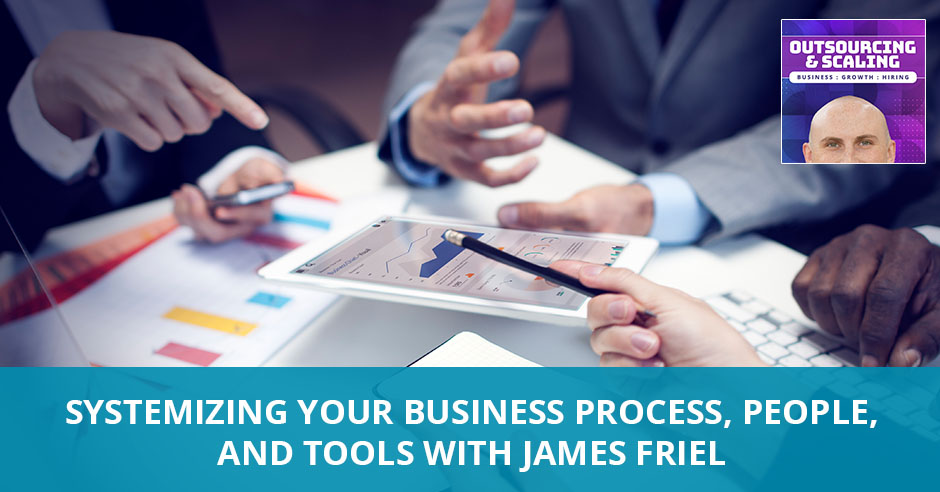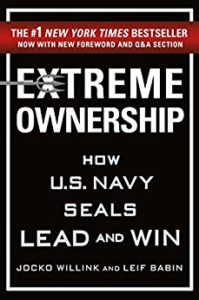


James Friel is an entrepreneur, consultant, and author who helps entrepreneurs systemize, grow and scale their business. After leaving his corporate job as a Global Head of Digital Strategy for HSBC Bank in 2011, James has simultaneously run multiple seven-figure companies and has consulted with CEOs, entrepreneurs, and executive level staff at companies ranging from fortune 500 corporations to smaller, more entrepreneurial ventures. In this interesting conversation, James tells how a company can systemize and manage their people, process, and tools to enjoy freedom while running their company. He advises how to choose business partners and explains the process that he applies not only on the marketing side but to the business as a whole.
—
Listen to the podcast here:
[smart_track_player url=”https://www.podetize.com/statsapi/www.podetize.com/wp-content/uploads/fileuploads/11-5b145ef137b51b3d1af0633e9305c43d/04/2019/4f5c16d42b051f7df7e7f962c6982840.mp3″ title=”Systemizing Your Business Process, People, And Tools with James Friel” artist=”Nathan Hirsch” image=”https://freeup.net/wp-content/uploads/2019/04/OAS.png” ]
Download the audio file here.
Systemizing Your Business Process, People, And Tools with James Friel
I have a special guest, James Friel. How are you?
I’m awesome. How’s it going?
I’m pumped to have you on. For those of you that don’t know, James is an entrepreneur, consultant and author. He helps entrepreneurs systemize, grow and scale their business by getting them out of the day-to-day operations of running companies. They can make money, have more time and freedom. Since leaving his corporate job as a global head of digital strategy at HSBC Bank in 2011, he has simultaneously run multiple seven-figure companies. He has consulted with CEOs, entrepreneurs and executive level staff at companies ranging from Fortune 500 corporations to smaller, more entrepreneurial ventures. It’s quite a resume and you’re all about systems and processes, which I’m all about. The name of the show is Outsourcing and Scaling, so we’ll definitely talk about that. Let’s take a step back. I don’t need your entire early life, but what were you like as a kid? Were you a rebel? Did you know you wanted to be an entrepreneur? I always like to get the behind the scenes before you went entrepreneurial.
I don’t think I knew that I wanted to be an entrepreneur as much as I knew that I like selling things to people. I always felt better when I was in charge. If that was the early indicator, then it was there.
What kind of investments did you make into yourself as you were growing? It could be books, courses, money or whatever it is. Was there any investment that paid off down the line?
I made tons and tons of investments in my personal development, my education, my professional development, hiring the right mentors, joining masterminds, going to conferences and events. The best investment you can ever make in yourself is the time that you spend with the people who are on the same mission as you. You’ve got to get a peer group and a group of people who are setting that new normal for you so that you’re constantly surrounded by people who are experiencing wins and success. You become like those people. As Jim Rohn said, you become like the average of the five people that you hang out with the most. That core group of people that you hang out with is, is absolutely the most important thing.
How did you get to that point because I imagine you had to say no a lot along the way? The friends you have in high school and college aren’t necessarily all going to go out and become great entrepreneurs. How did you surround yourself with those type of people?
Most people want to give their best but they’re not typically put in situations where they can give their best.
The first thing to say about that is just because your existing friends don’t want to grow businesses and don’t want to do all those things, it doesn’t mean they’re bad people or you should like, “You suck because you don’t have this big dream as I have.” Other people have different dreams. First and foremost is being clear that your dream does not make you better or you’re not more important. It’s different. If somebody wants to spend their life doing something that you don’t like, that’s okay. The first thing is don’t get angry with those people. Be like, “I’m different and I’m going to go find other people who are different like me.” I’m still friends from high school. I’m still friends with lots of different people. It doesn’t mean that I’m interacting with them in the same way that I’m interacting with the people that I’m running with, growing businesses alongside and stuff. They’re friends and we’re still in contact with each other. That is the first thing.
The second thing is, “People who are doing something similar to what you want to be doing are always hanging out and congregating somewhere.” Early on, for me, it was finding all these cool sounding conferences, events, things and going there. It’s the same kind of people are there. You start developing friendships. Some of them turn into networking opportunities, others turned into business relationships and things. It’s taking a step back and saying, “Maybe I don’t know where all those people are,” but if I had to guess, where might they be hanging out? You go to those places and you’ll start meeting the right people.
Let’s jump back to your story, in 2011 you leave this corporate job, what’s next? Did you create a big plan? How did you figure out the next steps?
It was a little bit precarious. I knew that I wanted to leave my corporate job for a while and I had a great job. It was a super amazing position and a great company. I was sitting with my manager at the time who was running marketing for one of the biggest companies in the world. We’re sitting in a meeting room in London and he looks at me and says, “We want to promote you, we want to move you over to London full-time. We want to take care of all this other stuff. It would be great if we could start grooming you to take over my role in the next five years or so.” What ordinarily should have been an epic celebration and amazing news, it hit me that, “If that’s the next step here, I don’t want that as my next step.”
I got to make a decision because it was an ultimatum. Everybody was getting consolidated to London who had these big positions and staff. He’s like, “You’re either here or we were going to let you go.” I was, “That’s do or die.” I said, “I’m not in. I don’t want that as my next step. I appreciate it. It sounds amazing but I’m going to get out.” Everyone was like, “You’re out of your mind.” A lot of people in my life. I left and found a guy who was already running a consulting company doing digital strategy, analytics and stuff that I had a background in. I asked him, “What if I help you grow this company, but I came on board as a partner from here on out.” I was responsible for sales, business development and helping to grow the team. That’s what I did. I found somebody who had a relationship with, I saw an opportunity and I took it. I sold $1.2 million consulting services in the first twelve months after I left.
Would you say that sales are your strong suit, is that your core competency? If so, what else would you consider? Because you know this, when you’re hiring other people, you’ve got to focus on what you’re good at. What would you say your core competencies are?
I’m very good at sales, but I would say my core competency is finding the talent and developing the talent in other people. That’s what I’m good at.

When you’re looking for talent, what are you looking for? I always talk about the triangle of skill, attitude and communication and everyone has different things you’re looking for. Do you have a certain type of person that you’re looking for?
It depends on the role. I’ve gotten very deep into understanding the types of roles that you’re hiring for and then making sure past experience matches up, attitude matches up and personality type. I’m super big into different personality types and stuff because you want to get the best out of that person. Generally speaking, most people want to give their best, but they’re not typically put in situations where they can give their best. The thing that they’re good at is only a sliver of the time that they spend doing something. I want to get the maximum out of that person, both for them and for me because they’re going to feel more fulfilled.
For me, they’re going to do a much better job if they’re in the right spot. It comes down to first being crystal clear on, why am I even bringing somebody in? What is the role? What are the responsibilities? What are they supposed to do? I always joke around, it’s like playing Tetris. You’ve got all different shaped blocks and everything but make sure you know what block you’re looking for and then go out and find that person. Make sure that they’ve got the past experience that’s going to add value to there. Past experiences and everything sometimes is important depending on the role. Make sure their personality tendencies, what they love to do versus what they hate to do. What their superpowers are versus their Kryptonite, line up with that role. That’s some high-level stuff that is super easy to say but a lot of people have trouble with it. I used to have a lot of trouble with it too.
Once you get them, that’s the beginning. Then you got to figure out how to get that team together and how to motivate them. Can you talk a little bit about that and any strategies that you’ve used? You’ve built a lot of teams over the years for you and for your clients.
The biggest thing is that people know where they’re going. Everybody wants to know where we’re going. If people come into work every day and they’re saying, “This is what everybody’s focused on. This is our next goal. This is what we’re trying to achieve.” It’s amazing how much less of the drama or nonsense that you have to deal with simply because everyone’s clear, everyone can answer where are we going, what are we doing and what’s our target on the wall? That’s one part of it. The other part of it is continuing to focus on that talent development. People want to be in a place where they feel recognized, valued and encouraged to continue to become better versions of themselves.
Staying in touch with the people on your team and measuring their progress, not so that you can beat them down, but measuring their progress so that you can help them achieve more is such a monumentally important thing. Few people are doing it because it feels like work or it feels like a place where, “I should be spending my time focusing on sales or focusing on all these other things.” There’s an old saying that says, “If you want to go fast, go alone. If you want to go far go together.” You need to build a team that is capable of going far and fast. You can get the efficiency dialed in after the fact, but you’ve got to nurture, develop the talents and the strengths in the people that are already reporting to you.
Are you a fan of meetings?
The wonderful thing about being a CEO or being an entrepreneur who’s running your own business is that you’re responsible for everything.
I’m a fan of meetings, but I’m not a fan of unnecessary meetings. I’m the last person on planet Earth who wants to feel like I’m wasting my time. We do have meetings, we have planning meetings to plan out the year, the quarter, month and all that sort of thing. We have project meetings for specific projects that are moving things along. If a meeting has a clear outcome and the outcome is designed to help us achieve our goal, I’m cool with meetings. If it’s like, “Let’s get together and talk about what’s going on.” It is endless rambling, which tends to happen a lot, I want to slit my wrists like the next guy. I can’t stand those meetings.
What is your ideal meeting look like? Do you have a certain structure?
I’ll give you an example of two types of meetings that we have. We have a weekly sprint meeting, which is where we go over all of our wins and things we got done. We go over all of the things that we’re committing to get done. Then we address any roadblocks that might begin in everybody’s way or anybody’s way. That meeting happens clockwork and it happens on Monday mornings. Everybody’s clear on exactly what they need to do to prepare for that meeting. Everybody comes in and say, “Here’s what I got done, here’s what was left open and here is what I’m committing to.” Everyone’s very tight in their communication with that. We have clear expectations about what’s actually going to get done.
The second type of meeting is we have a couple of different ones, but we have departmental meetings. I will give an example. I have a marketing meeting on Wednesdays. The first ten to fifteen minutes of that is us reviewing all of our stats and all of our KPIs from the previous week. How many ad campaigns do we have running, what’s our cost per lead, what’s our cost per acquisition? All those things so that everybody’s centered on the numbers that we’re really trying to hit. The second half of that meeting usually is having a more open conversation or brainstorm around some of the different things that we’re trying. Split tests or look at that week and reaffirm some of the commitments that people have throughout the week. Those are two kinds of meetings that I find particularly important to keep the tempo and to keep everybody focused with laser precision on the right things.
Let’s say that someone out there who struggled to hire. We’ve all made bad hires before. Maybe they’re a newer entrepreneur, they are frustrated. Maybe they have a team and it’s not as efficient as they want it to be. What advice would you give them?
It’s harsh advice but it has to be said anyway. The wonderful thing about being a CEO or being an entrepreneur who’s running your own business is that you’re responsible for everything. That’s a cool thing. Most people who are running their own companies feel that. I want to make sure we’re going in the direction that’s important to me. That the awesome side of that. The downside of that is every mistake or every other thing that’s happening inside the business that you don’t like, it’s also because of you and people go, “No, wait a minute my employees suck, my customers suck. “ You’ve got to be real with yourself and recognize that you’re the one who hired that employee. You’re the one who gave them the training or lack thereof that you did. You’re the one who gave them or didn’t give them the structure. You’re the one who set the goals or didn’t set the goals. You’re the one who’s hanging on to them if they suck. It all comes down to you. These Navy SEALs wrote this great book, Extreme Ownership and they talked in that book about Hell Week and there were these six teams of guys in life rafts and they had to complete this obstacle course.
The first team kept coming in the first place all the time. There was a bad penalty for coming in the last place. You have to do it again even though you hadn’t slept in four days. nobody wanted to come in last place. Finally, the team that consistently kept coming in the last place, the guy that was leading that team came up to the SEAL commander and he’s said, “I can’t win. My team sucks.” The SEAL commander said, “Wait a second.” He swapped the team leader from the first team with the last place team. The previously last-place team with the new leader won the next time around. It’s like, “It’s not the people, it’s how you are showing up as a leader.” I would say the number one thing to look at is how are you causing the different things that you’re seeing because they’re all coming from you. The faster you get okay with that, the faster you recognize how you’re causing it, the faster you can correct it. If it’s always somebody else, you don’t have the chance to make an improvement there.

Let’s turn our attention more towards the systems which goes hand in hand with the hiring. You’ve seen a lot of businesses, I’m assuming you’ve seen a lot of chaotic businesses. You go into a business, their systems and processes are not working. Where do you start? How do you come up with a plan to, “Get this back on track?”
One of the things that you have to do first is you have to zoom out and you have to look at the whole business. Because as much as we like to dig into the sexy things such as the Facebook ads, all the things that people are seeing and posting on social, it’s like an entire business here. Marketing is only one part of the business. There’s marketing, sales, delivery, operations and there are finances. Those are five core pillars that you have to keep your attention on to make sure everything is working together. First, we’ll acknowledge that we’ve got these five areas of the business and then we want to look at them one by one and we want to say, “Where are we? Are we red?” Which means we get no leverage here, nothing’s really working well. It takes a ton of manual effort. Yellow, we’ve got some systems in place, but they’re not working together. Green is when we’ve got everything working together. We look at those five pillars of red, yellow, green.
What we’re identifying in that red, yellow, green is we’re drilling into what a system really is, which is people processes and tools. It’s all three of those things working together that create a system. If there’s a system that’s red, it’s because we either don’t have people, we don’t have the right people or those people are there, but they don’t have any processor instructions to follow. We haven’t helped them with any tools that can make the job easier or more effective. I take an overall look at the entire business with those five pillars and then red, yellow, green and all those five pillars. Then we say to ourselves, “This is where we are.” You must be brutally honest and clear with where you are if you want to make any change towards any direction in the future. If I’m looking at your business and you’re not telling me the truth and marketing is on red, even though you’re telling me it’s on the green, I’m going to say, “We don’t need to focus on that. We need to focus on something else.”
You’ve got to take stock of the whole thing and then say, “Red, yellow, green, where are we?” Sales are always going to be number one. Every business needs to make sure they’re making money. There’s a lot of people who go out and they do all this crazy stuff and it’s everything but the actual selling. Those are the guys that starve and go out of business. It’s unfortunate because they probably had a cool thing but they weren’t spending enough time on sales. When you get marketing, sales and they’re working reasonably well, the next problem that you have is, “How do I handle all of this? How do I handle the growth that’s coming from this?” If somebody is on the green with marketing and sales, but they’re on red with delivery and operations, well then that’s a totally different case. We want to drill into delivery and operations and say, “How can we support all the marketing and sales that are coming in the door.” It’s a flexible framework that allows, not a cookie cutter answer, but a framework in which to get the right answer for whoever’s looking at their business.
In my head, I’m thinking I’m going through the accounting team, marketing team and sales. Where are we green, yellow, red? You’re right. It’s a combination of the people you hire, the process you have and the tools. Are there certain go-to tools that you go into your business? You’re like, “It would really help you if you add this.” Are those consistent or does it depend on the business?
It’s pretty consistent and I think the tools are different for each one of those pillars. For marketing, I build all my friends’ stuff with ClickFunnels. It’s great. It’s easy to use. It’s easy for me to get people to help me with it. Unless somebody is a WordPress wizard and they insist on doing it themselves in WordPress, it’s an online business, I’d say, “Here use ClickFunnels.” You’re doing a lot of eCommerce stuff. There are cool ways that you can tie Click Funnels and Shopify together. It depends. For project management and things like that, I like Trello. Asana is another good tool. We have dashboards that we use to pull all that information out of them. On the finance side, I think QuickBooks Online is a great tool. It’s super easy. There are definitely go-to tools, but then sometimes, what needs to be customized here? Can we leave the basic stuff in place and move on?
Let’s talk about your journey again. What are some failures that you had to overcome? A lot of people are like, “Here’s James. He’s ran a lot of sets with businesses. He goes into a company, identifies it’s red and makes it turn green.” I’m sure you’ve had some failures along the way as we all have. Is there any one failure that stands out? How were you able to overcome that?
Everybody who’s successful fails probably more often than they actually succeed.
It’s easy. I used to do this too until I realized that everybody who’s successful fails probably more often than they actually succeed. When you’re and you’re trying to figure things out, there’s this illusion that the people who do well never went through all of the trials and tribulations that you’ve been through. That’s not true. The journey and the ascent are difficult, challenging and sometimes frustrating no matter who you are. I have had ridiculous amounts of failure and that’s 100% true. I probably would say the failures have been the things that have taught me the most. The business that I mentioned that I became a partner in, help grow sales and everything. I was out doing all the selling and building the team and I wasn’t focused on our numbers. I wasn’t focused on our financials. We were flying around the world to land contracts and had meetings with our clients.
There came a time for us to look at our P&L and our expenses. Where did the money go? I didn’t know. My partner and I had this super-tense conversation for six hours in a small meeting room in Manhattan. It was incredibly uncomfortable for both of us, but there was such a miscommunication. I couldn’t figure out where at least $100,000 to $150,000 went. That’s still a lot of money. We wound up stopping working together. It wasn’t because of that. It was because of a few other things too. I remember leaving that situation, leaving that meeting room. I was making all these sales and I thought this was the greatest thing ever and here’s something that smacked me in the head. I had to figure out what am I going to do next? Am I getting to continue in this business? Am I going to start something else and be totally honest?
That took me out of the game for a few months where I don’t know what to do. That period of reflection was important. I wrote down every lesson that I learned from that experience. I have 25 lessons in an Evernote file that are each worth over $5,000 or $6,000 each because of that thing. Failure is only permanent when you choose to make it permanent. If you decide to keep going, then it’s another blip on the radar and you got to be cool at that. That’s one story out of dozens and dozens, where I could tell I am moving a hundred miles an hour and I felt like I fell flat on my face. You got to be like, “I got to peel myself off the ground. I got to figure out what’s next and keep going.”
Let’s talk about business partners because you mentioned that you had to break up. I’ve left a business partner before. I love the business partner I have, Connor. What do you need in a business partner? If people are out there and are like, “I don’t think I could do this myself. I’m looking for a business partner.” What should they be looking for and what should they be aware of?
Especially early on, people gravitate towards business partners. I want to feel I’ve got a company battle that we’re fighting together and then it’s totally a legitimate thing. What you’ve got to get clear on is the division of roles and responsibilities among business partners. The very first problem that most business partners have is that they’re not clear who is doing what and who’s responsible for what. That tends to lead to possible unmet expectations where you can get upset about things. “He’s not pulling his weight.” or “He’s not doing whatever. She’s not doing this.” If you have something to come back to you say, “Here’s my role and here’s what I’m responsible for. Here’s your role and here’s what you’re responsible for,” at the very least you have a basis for having a conversation to recalibrate things. If you never have that conversation about, “Here’s my role, here’s your role, here’s what I’m responsible for and what you are,” then you have nothing to come back to and you’re always on unsteady ground. That’s definitely the first thing. The second thing is you shouldn’t be in partnership with somebody who’s exactly like you. It makes no real sense to do that.
It makes a lot of sense to be in partnership with somebody who is very complimentary to your skill set. I love going out and selling. I love going to speaking events, meeting people and doing all that stuff. If I had a partner and they were like me, that means that the business back at home is not getting run while both of us are out doing that thing or the opposite of that. If both of us hate going out into the world, meeting people and networking, we’ve got probably the best-refined system on planet Earth, but we don’t have anybody promoting or going out. Find complementary skill sets but even when you find those complementary skill sets, make sure the roles and responsibilities are crystal clear and the division of labor is black and white.
James, thank you so much for coming on. How can people find out more about you?

You could go to my website, JamesPFriel.com. We’ve got some free downloads there. We’ve got some classes, courses and podcasts. That is fun called Just The Tips. JamesPFriel.com is where you can get access to that and get in touch with me if you want to.
I had a blast in your podcast. People if you ever checked it out, it is probably one of the most fun podcasts I’ve ever been on. James thanks again for coming on and we’ll talk soon.
Thanks so much, Nathan. I appreciate you having me.
Important Links:
- James Friel
- Extreme Ownership
- ClickFunnels
- WordPress
- Shopify
- Trello
- Asana
- QuickBooks Online
- Evernote
- www.JamesPFriel.com
- Just The Tips
About James Friel
 James P. Friel is an entrepreneur, consultant, and author who helps entrepreneurs systemize, grow, and scale their businesses by getting them out of the day to day operations of running their companies so they can make more money and have more time and freedom.
James P. Friel is an entrepreneur, consultant, and author who helps entrepreneurs systemize, grow, and scale their businesses by getting them out of the day to day operations of running their companies so they can make more money and have more time and freedom.
Since leaving his corporate position as Global Head of Digital Strategy for HSBC Bank in 2011, James has simultaneously run multiple 7 figure companies and has consulted with CEOs, entrepreneurs, and executive level staff at companies ranging from Fortune 500 corporations to smaller, more entrepreneurial ventures helping them systematically increase efficiency while also growing their sales.
James holds a Bachelor of Science from Embry-Riddle Aeronautical University and lives in Boise, Idaho where, in addition to being a student of the game of business, he enjoys working out, drumming and skiing.
